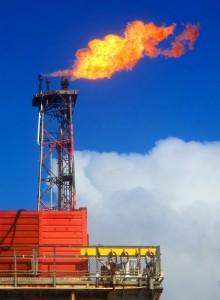Why Are We Pretending Natural Gas Isn’t a Fossil Fuel?

Natural gas being flared on an oil platform in the North Sea . www.eanvt.org/net-zero-montpelier.
Photo credit: Wikipedia
New England’s six governors are now planning for the region to use more natural gas, by building more pipeline capacity. The group of six announced a plan late in 2013 to expand natural gas use, requesting technical and financial help for this expansion from ISO-New England, the region’s electric grid operator. Since the issuance of Vermont’s 2050 Comprehensive Energy Plan, Vermont has had in place a clearly stated goal of drastically reducing fossil fuel over the next 36 years, and now our governor wants to increase its use. This does not make good sense.
Increasing the importation and use of natural gas is bad energy policy for a number of reasons:
- Natural gas is a carbon fuel. Burning it releases carbon dioxide (CO2), which is increasing the temperature of our environment, with negative effects. I believe we will soon need to put a price on our carbon emissions to decrease carbon fuel use in a meaningful way. This “carbon tax” is not currently factored into the cost of natural gas, but it will be.
- Natural gas is a finite fuel and will be depleted after this current short-term production bonanza. As more natural gas is burned to heat homes, businesses, and fuel power plants, we are going to end up by 2020 with a shortage of natural gas. The current “fracked” gas oversupply is a bubble that is going to burst. Fracked natural gas wells deplete very fast, and new wells will need to be drilled in five to eight years. By contrast, conventional natural gas wells generally have produced for decades. It is unwise to make long-term financial and environmental decisions on the basis of a short-lived phenomenon.
- Electricity production in New England is already natural-gas dependent. It is our primary source of electricity generation, and absolutely should not be increased. Why increase natural gas use when we have a losing hand already? Finite resources and global warming are pointing us toward the need to increase applications of renewable energy, not create more infrastructure and systems dependent on a finite fossil fuel, which stand to increase in cost over time.
- We in Vermont will be left with paying to import more natural gas into southern New England, to our economic disadvantage. As more natural gas is used, the price will go up, and it will cost all Vermonters more for energy.
- Increasing natural gas use also undermines the drive to make our local energy supply renewable. Today about 50% of New England’s electricity is produced by natural gas power plants, as against about 15% from all renewables combined (wind, solar, hydro, etc.). For our own economic and physical well-being and that of our children and grandchildren, we need to be aggressive about quickly reducing our reliance on all fossil and nuclear fuel options, and increase renewables in their place.
Using more natural gas now may seem like a good idea, but it is a short-sighted “fix” in both senses of the word – a patchy gamble of a solution that continues our addiction to fossil fuels. We need to take the long view. Over the next decade, fossil fuel prices will continue to rise, and our economy will suffer. I suggest we install over 1,000 megawatts of wind and solar in Vermont. Renewables are a fixed-price source of energy that is non-polluting. It is high time we get serious about making them the basis of our energy economy.
David Blittersdorf is the President/CEO of AllEarth Renewables in Williston, VT — a company that specializes in the design and manufacture of the grid-connected AllSun Tracker solar energy system. He founded NRG Systems in Hinesburg, VT, and is the managing partner of Georgia Mountain Community Wind.








Fossils are fossils. Fracking is fracking. Natural gas is not natural. In the the case of Gaz Metro, Vermont Gas is not Vermont nor gas. It is Gaz and a subsidiary of Gaz Metro. For my poor rural neighbors, we would rather not be a transmission fields for a Gaz shuttle, we would rather keep Gaz out of our aquifer and lake, waterways, gardens. Likewise, Mr. Blittersdorf, solar panelled fields are not beautiful, they are not farms, they are not zero footprint and costs should not be subsidized. I oppose the pipeline. You have excellent points and perhaps someone might listen to you. We little people have to scratch and claw to get any press.